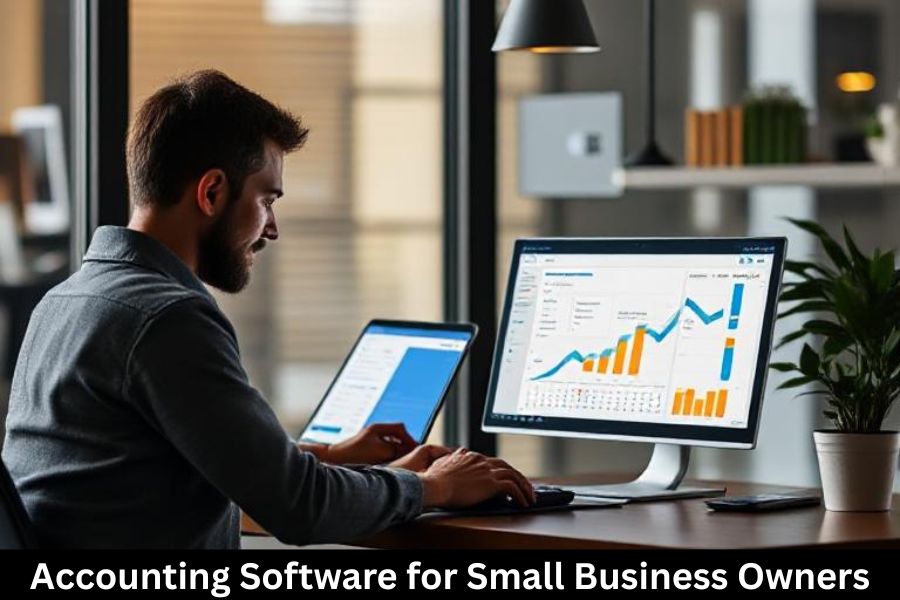Running a small business is tough, but managing finances doesn’t have to be. Accounting software for small business owners has become a game-changer, allowing entrepreneurs to streamline their financial management, save time, and ensure accuracy. Whether you’re dealing with invoices, payroll, or tax filings, the right software can take a huge load off your plate. But what exactly is accounting software, and how can it help your business thrive?
What is Accounting Software?
Accounting software is a digital tool designed to help businesses manage their financial transactions, track expenses, generate invoices, and prepare reports. For small business owners, it simplifies everyday tasks like billing, tracking cash flow, and preparing for tax season.
By automating routine tasks, accounting software reduces the chance of human error, provides real-time updates on your financial status, and allows for easy collaboration with other team members or accountants. In short, it takes the stress out of managing finances and helps keep your business organized.
Why Should Small Business Owners Use Accounting Software?
Time-Saving: With accounting software, tasks that once took hours, like reconciling accounts or generating invoices, are completed in minutes.
Increased Accuracy: The risk of manual errors is reduced since calculations are automated. This ensures accurate financial data that can help you make informed decisions.
Better Tax Management: Most accounting software comes with tax features that calculate your obligations and prepare reports, ensuring you remain tax-compliant.
Top Features to Look for in Accounting Software
When choosing accounting software for your small business, look for these must-have features:
- Invoicing and Billing: The ability to create and send professional invoices with customizable templates. Many tools also let you set up recurring billing for subscription-based businesses.
- Expense Tracking: Tracking every penny is crucial for understanding your cash flow. Software that categorizes expenses automatically can save you time and effort.
- Payroll Integration: If you have employees, a system that supports payroll management can help you automate payments, track hours worked, and handle tax deductions.
- Financial Reporting: Tools that generate reports like income statements, balance sheets, and cash flow statements will help you assess the health of your business and make data-driven decisions.
- Tax Compliance: Look for software that offers features like automatic tax calculations, tax report generation, and reminders for tax deadlines.
Best Accounting Software for Small Business Owners
Not all accounting software is created equal. Some are more suited for freelancers, while others are designed for growing businesses. Here are five popular options:
- QuickBooks Online: A widely used accounting software that offers a range of features, including invoicing, payroll, tax reports, and project tracking.
- Xero: Known for its simplicity and ease of use, Xero is great for small businesses that need powerful tools without the complexity.
- FreshBooks: Ideal for service-based businesses, FreshBooks makes invoicing and time tracking incredibly easy.
- Wave Accounting: A free tool with all the essential features, Wave is perfect for small businesses on a budget.
- Zoho Books: A cost-effective solution for small businesses, Zoho Books offers invoicing, inventory management, and easy tax filing.
How to Choose the Right Accounting Software
Selecting the right accounting software depends on your business needs:
- Evaluate Your Business Requirements: Do you need advanced features like inventory management, or will simple invoicing and expense tracking suffice?
- Ease of Use: Choose software that is user-friendly, even if you’re not tech-savvy. A clean, intuitive interface will save you time.
- Consider Scalability: Look for software that grows with your business. If you plan to expand, choose a system that can scale accordingly.
- Check Pricing and Features: Compare pricing models and the specific features each software offers. Some tools may offer tiered pricing based on your business size and needs.
How Accounting Software Helps with Taxes
One of the key advantages of accounting software is its ability to help with taxes:
- Tax Calculations: Software often automatically calculates the taxes you owe based on your financial data.
- Tax Reports: At the end of the year, you can generate tax reports with just a few clicks, making it much easier to file your taxes.
- Compliance: Most software updates its tax calculations based on the latest regulations, helping you stay compliant with local, state, and federal tax laws.
Common Mistakes to Avoid with Accounting Software
Even with accounting software, small mistakes can cause problems. Here are some common errors to avoid:
- Not Regularly Updating Financial Records: Keep your software updated with all transactions to ensure your financial data remains accurate.
- Misclassifying Transactions: Double-check your categories to avoid issues when generating reports or preparing taxes.
- Skipping Software Updates: Always install software updates to keep your system secure and functioning optimally.
Conclusion
Accounting software is a must-have tool for any small business owner who wants to stay organized, save time, and ensure financial accuracy. It simplifies complex tasks like invoicing, expense tracking, and tax filing, giving you more time to focus on growing your business. Whether you choose QuickBooks, Xero, or another option, investing in the right software can make a significant difference in your financial management.



